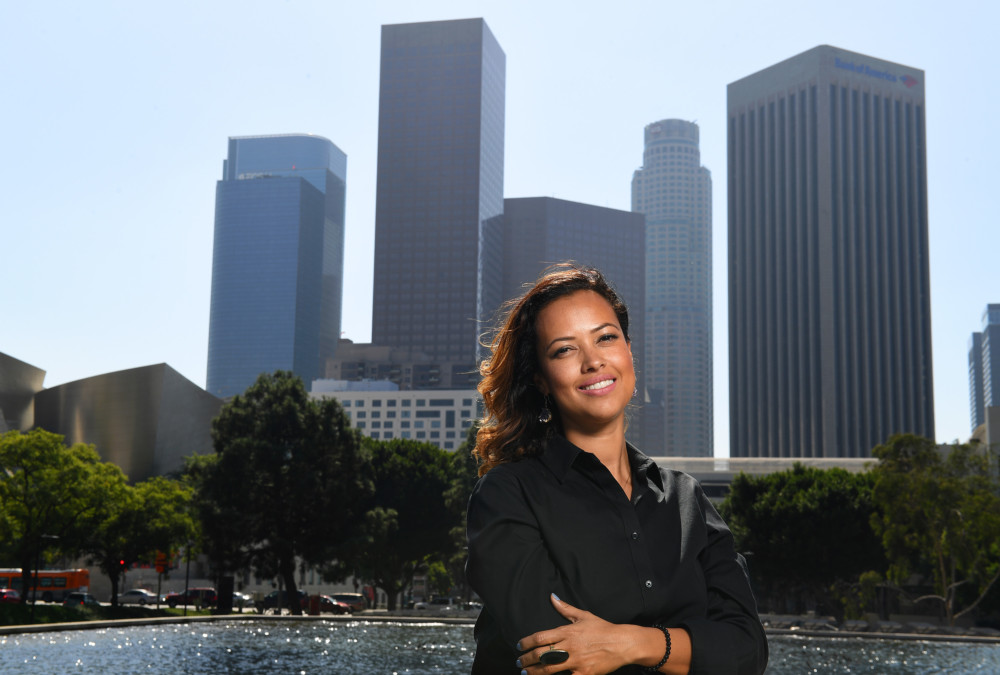By Ivan Penn
Los Angeles Times
WWR Article Summary (tl;dr) In her role as a consultant and as a commissioner for the Los Angeles DWP, Aura Vasquez says her aim is the same: to help people who don’t have a healthy environment and safe places to play.
LOS ANGELES
Aura Vasquez runs a consulting business that bears her name and is one of five commissioners on the Los Angeles Department of Water and Power’s board. Vasquez, 39, provides environmental and political consulting as the sole employee of her firm, which she bolsters as needed by hiring contractors.
Her consulting work includes the successful push for a law that requires utilities to produce 50 percent of their electricity from clean energy sources by 2030 and to reduce greenhouse gas levels to 40 percent below 1990 levels.
At the DWP, the nation’s largest municipal utility, her potential impact is broad as the utility employs more than 9,000 people and serves 647,000 water customers and 1.4 million electricity ratepayers.
Protecting the Earth: Vasquez says she became an environmentalist as a child. At age 11, she learned about global warming at a science show in her native Colombia. Ever since, she says, she has advocated to “bring about a world that is not only more just but is just free of pollution.”
Aiding the marginalized: In her role as a consultant and as a commissioner for the DWP, Vasquez says, her aim is the same: to help people who don’t have a healthy environment and safe places to play. “Both of my careers are intertwined with my calling to continue the crusade to protect the environment, to give a voice to people who traditionally don’t have a voice.”
Grassroots organizer: In 2013, Vasquez founded her consulting business, and in May 2017 she was sworn in as a DWP commissioner. Those roles emerged from her grassroots campaigning and protesting as an organizer for the Sierra Club in its Beyond Coal campaign.
Vasquez led the effort to convince Los Angeles to wean itself from coal-generated electricity and to implement a single-use plastic bag ban. She recently completed an executive education program at Harvard University’s John F. Kennedy School of Government focusing on leadership, organizing and action; it was taught by renowned grassroots organizer Marshall Ganz, who helped craft the neighborhood organizing initiative so crucial to Barack Obama’s historic 2008 presidential campaign.
Early learner: In her tiny hometown of Candelaria, Colombia, Vasquez became an early and quick study as a student. Her stay-at-home mom taught her to read, write and recite poetry.
So by age 4, Vasquez entered first grade. “I grew up in a very sheltered environment where my schoolteachers were like my parents.” They scolded and advised, she said, providing guidance that has carried her throughout her life. That all helped develop a strong sense of community, Vasquez said.
Preteen community organizer: After that science show about global warming when Vasquez was 11, she founded the first environmental club at her school. “I went to my principal and asked, ‘What are you going to do about global warming?’ She asked me, ‘What do you want to do about it?'” Already on a fast track, Vasquez graduated from high school just four years later at age 15.
Strong women: Education helped establish Vasquez’s sense of self, seeing strong women educators in her family and community as well as learning about women who helped with the liberation of Colombia from Spain, she said. “It’s interesting because, you know, in those days women didn’t really have that kind of rebellious role,” she said.
The Big Apple: Vasquez was 18 when her family moved to the United States, making their new home in New York. After spending time learning English, she enrolled in City University of New York-Lehman and earned a degree in political science. She moved on to jobs with the United Way of New York and as a political advisor for U.S. Rep. Eliot Engel, D-N.Y., building experience in lobbying and politics that would prepare her for a move to California.
Coal-heavy LA: When Vasquez began pushing for Los Angeles to give up its coal-fired power plants, the city was producing about 40 percent of its electricity from the fossil fuel. As the campaign ramped up in 2010, Vasquez used her passion for the environment, knowledge of politics and concern for people to press for change. It all led to what some saw as her unlikely appointment to the DWP’s board of commissioners, an unpaid, voluntary position, by Mayor Eric Garcetti. Vasquez already is mixing things up by becoming the only commissioner to hold office hours to meet with the public.
Tree huggers: Relatives recently came to see her at her Los Angeles home, and “the first thing they did when they came to visit me here was hug that tree,” Vasquez said with a laugh, pointing to a towering sycamore in her backyard. That hug reflected the passion she and they have developed for the environment. “We are not your typical tree-hugger-looking people. This very intimate relationship with nature, I learned back home.” She said that as a consultant for nonprofit organizations, community groups and others as well as at the DWP, she’s optimistic about having a positive influence on the direction of environmental and social justice policy in Southern California.














































































































































































































































































































































































